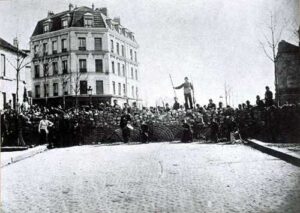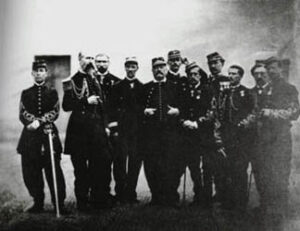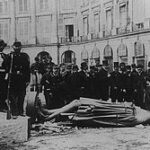Share This:
August 15, 2012 | Theatre,
A Paris Commune Timeline
Compiled by Corrie Glanville
Can’t keep all the events leading up to and surrounding the Paris Commune straight? This timeline (adapted from http://www.marxists.org/history/france/paris-commune/timeline.htm) might help! Brush up on your historical background before you head over to the Paramount Center Mainstage to see The Civilians’ Paris Commune SEP 20-23.
July 19, 1870: After a diplomatic struggle over the Prussian attempt for the Spanish throne, Louis- Napoleon Bonaparte III declares war on Prussia.
August 4-6, 1870: Crown Prince Frederick, commanding one of the three Prussian armies invading France, defeats French Marshal MacMahon at Worthand Weissenburg, pushes him out of Alsace (Northeastern France), surrounds Strasbourg, and drives on towards Nancy.
September 1, 1870: The Battle of Sedan; MacMahon and Bonaparte are defeated at Sedan.
September 4, 1870: At news of Sedan, Paris workers invade the Palais Bourbon and force the Legislative Assembly to proclaim the fall of the Empire. By evening, the Third Republic is proclaimed and the provisional Government of National Defense (GND) is established to continue the war effort to remove Germany from France.
September 6, 1870: The GND issues a statement: blames war on Imperial government, it now wants peace, but “not an inch of our soil, not a stone of our fortresses, will we cede.”
October 27, 1870: French army, led by Bazaine with 140,000-180,000 men at Metz, surrenders.
October 30, 1870: French National Guard defeated at Le Bourget.
October 31, 1870: Upon the receipt of news that the GND had decided to start negotiations with the Prussians, Paris workers and revolutionary sections of the National Guard rise up in revolt.
November 1, 1870: Under pressure from the workers the GND promises to resign and schedule national elections to the Commune — promises it has no intention to deliver. With the workers pacified, the government violently re-establishes its domination over the besieged city.
 January 22, 1871: Paris workers hold a revolutionary demonstration; they demand the overthrow of the government and the establishment of a Commune. After a massacre of unarmed workers, the government begins preparations to surrender Paris to the Germans.
January 22, 1871: Paris workers hold a revolutionary demonstration; they demand the overthrow of the government and the establishment of a Commune. After a massacre of unarmed workers, the government begins preparations to surrender Paris to the Germans.
January 28, 1871: Paris is surrendered to the Prussians. While all regular troops are disarmed, the National Guard is permitted to keep their arms.
February 8, 1871: Elections held in France, unknown to most of the nation’s population.
February 16, 1871: The Assembly elects Adolphe Thiers as Chief Executive.
March 18, 1871:Adolphe Thiers attempts to disarm Paris and sends in French troops but they refuse to fire on Paris workers. Many troops peacefully withdraw, some remain in Paris. Thiers is outraged; the Civil War begins.March 26, 1871: A municipal council — the Paris Commune is elected by the citizens of Paris.
March 30, 1871: The Commune abolishes conscription and the standing army; the National Guard, in which all citizens capable of bearing arms were to be enrolled, was to be the sole armed force. The Commune remits all payments of rent for dwelling houses from October 1870 until April 1871.
April 2, 1871: The French Army begins the siege of Paris. The Commune decrees the separation of the Church from the State, and the abolition of all state payments for religious purposes as well as the transformation of all Church property into national property. Religion is declared a purely private matter.
April 20, 1871: The Commune abolishes night work for bakers.
April 23, 1871: Thiers breaks off the negotiations for the exchange, proposed by the Commune, of the Archbishop of Paris and a whole number of other priests held hostage in Paris, for only one man: Blanqui, who had twice been elected to the Commune but was a prisoner in Clairvaux.
May 9, 1871: Fort Issy, which is completely reduced to ruins by gunfire and constant French bombardment, is captured by the French army.
May 21-28, 1871:Versailles troops enter Paris on May 21. The French army spends eight days massacring workers and shooting civilians on sight. Marshal MacMahon, who would later become president of France, leads the operation. Tens of thousands of workers are summarily executed (as many as 30,000); 38,000 others imprisoned and 7,000 are forcibly deported.



![350px-Barricade18March1871[1] Soliders stand together](https://artsemerson.org/wp-content/uploads/2012/08/350px-Barricade18March18711-150x150.jpg)

![paris3[1] Poster of two people](https://artsemerson.org/wp-content/uploads/2012/08/paris31-150x150.jpg)


[…] of every project we take on. In the present, you can experience that in our September events around Paris Commune. There are films, there are performances, there are events and there are discussions. What will be […]